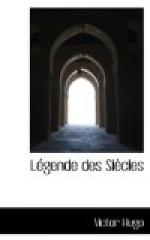chape is the Picard form of ‘cape’ (see note on LES PAUVRES GENS, l. 97). It is the name for a long cloak, fastened in front, and worn by clergy and choristers when performing Divine Service. Formerly any long loose cloak was called a charpe. As is still the custom in the Greek Church, images of the Virgin or saints are largely used, and they are found as ornaments on pieces of furniture and sacerdotal vestments.
L. 455. A peacock roasted whole and served up ornamented with its feathers was a favourite dish at the banquets of the fifteenth century.
hypocras, an infusion of cinnamon, sweet almonds, amber, and musk in sweetened wine.
Le roi d’Arle. See note to l. 179.
l’araignee. See note under PUISSANCE EGALE BONTE.
jacque (also written jaque), a short close-fitting coat or tunic.
vair (English vair), the fur of the squirrel, a highly esteemed and costly material for dress in the later Middle Ages.
chevalier haubert, i. e. a knight who has the right to wear the haubert or cuirass.
Urbain quatre, Pope (1261-. 1264). He is rightly described as the son of a cobbler.
Afranus, introduced as the bishop of Frejus, and one of Ratbert’s evil counsellors, in the poem of ‘Ratbert’. See note on l. 435 supra.
L. 721. For the element of supernatural vengeance on cruelty compare L’Aigle du casque, published in the 1877 series.
LA ROSE DE L’INFANTE.
A French critic has said happily of this poem: ’"La Rose de l’Infante” est un chef-d’oeuvre, digne d’etre illustre par Velasquez.’ (Gaston Deschamps in Petit de Julleville’s Histoire de la langue et de la litterature francaises.)
The little princess, of whom such an enchanting picture is given in this poem, is an imaginary figure. There was no Infanta of five years of age at the epoch of the Armada.
_ basquine_, a rich skirt worn by Spanish women.
point de Genes, Genoese lace, which at one time rivalled that of Venice.
fil d’or florentin, gold thread of Florence.
Duc de Brabant was one of the many titles of the King of Spain.
L. 69. See note on LA CONFIANCE.
glas (pronounced gla), ‘passing bell.’
vitreux: ‘glassy,’ ‘lack-lustre.’ The sunken eyes seemed of an unfathomable depth.
Iblis. See note on PUISSANCE EGALE BONTE,
Escurial. The vast and gloomy palace near Madrid built by Philip II in the form of a gridiron in memory of St. Laurence, on whose feast-day he won the battle of St. Quentin.
L’Inde. The inclusion of India in Philip’s dominions can hardly be justified. As King of Spain he possessed nothing in India, and as King of Portugal only a few trading stations and fortresses.




